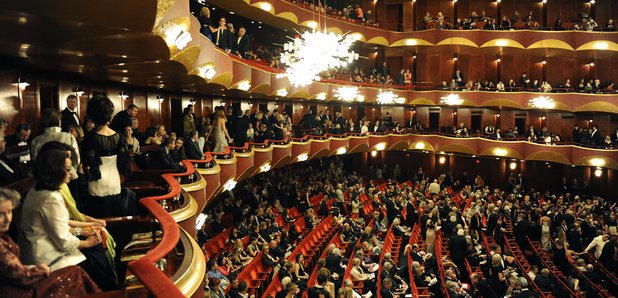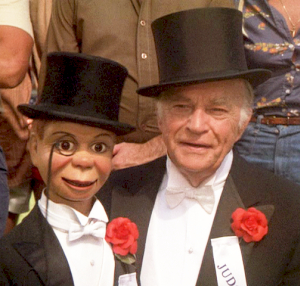A few weeks ago, when I was working on my article on new American opera (Part Two will appear this weekend), I requested an interview with the Metropolitan Opera’s Peter Gelb, mainly to talk about the Met’s commissioning program. Mr. Gelb gave me a generous amount of time, but he didn’t only want to talk about new American opera; he also wanted to discuss some of the issues I raised in this blog post about his record with new productions.
As usual, I was able to incorporate all too little of our lively discussion into the finished article. But it seemed selfish to keep it to myself, particularly since Gelb fully intended to make his thoughts public. So I’ve condensed the conversation -- meaning that I made some cuts and tightened some sentences, but did no reordering or changing of context -- and am presenting Gelb in his own words, without too much commentary on my end. The second part of the conversation, in which we actually talk about the Met’s commissioning program, follows tomorrow.
Peter Gelb: I know you made the point that it’s not new to be inviting interesting directors to come to work at the opera, and I’m not suggesting it’s new. What I do think is new is to try, with every new production, to get interesting directors on a consistent basis. I can take some credit and some blame, but maybe not to the degree you’re offering, as to what the results are. I meddle only in the most minor way: if something that they’re doing is impractical. Or if they ask me. But I’m not going to tell Patrice Chereau how to direct something.
(read more after the jump)
Anne Midgette: The Chereau was an existing production. [Chereau’s production of “From the House of the Dead” had its premiere at the Wiener Festwochen in 2007, and went on to the Holland Festival and the Aix-en-Provence festival, where it was recorded for DVD. After its Met triumph in November, 2009, it went on to La Scala this past February.]
PG That’s another fallacy. The impression from reading some articles is that somehow it’s a demerit for me, or somehow it’s not a credit for our work here, that we bring something that’s already been produced somewhere else first. I see that from the opposite side. I deliberately have gone against what the tradition has been, which is to incubate productions from the ground up here. Sometimes I’m incubating them overseas. But it’s not by accident. It’s on purpose.
ALM There’s a lot of new production rhetoric.
PG Well, maybe that’s our mistake. But the tradition here, and this is something that I did inherit, is anything that is new to the Met audience is a new production. Now obviously there are different types of new productions. There are some productions where we had nothing to do with the creation whatsoever, like “Hamlet.” But that’s very different from “House of the Dead,” where I was involved with discussions with Chereau and Stephane Lissner, who was involved in this project, long before it ever saw the stage in Vienna. And I was seeing models of it, and having the right to opine on it. I was an artistic partner in that five years ago. Maybe we should issue a press release with the genealogy of every production that we do.
What’s interesting is that there’s a great benefit in certain cases to having a production, and certainly a commission, start somewhere else. We have no previews here. We invariably, because of the incredible difficulties of working in the repertory system, see a production in the final stages of the rehearsal process, when it’s usually too late to make any changes… Any change you do has to be rehearsed. And once your show opens there’s no time to rehearse. You could have a minor staging change but you can’t do anything significant because there’s this domino effect that could happen, and you could potentially destroy something if you try something too radical.
[Gelb later gave two examples of upcoming co-productions with ENO: the Des McAnuff “Faust,” which opens at ENO in September, and a Deborah Warner “Eugene Onegin,” which will open at ENO in a few years before coming to the Met.]
PG With Butterfly [Anthony Minghella’s “Madame Butterfly,” the opening production of Peter Gelb’s tenure, which came to the Met from the English National Opera], because we were a co-producer -- I was at rehearsals in London -- we also collectively were able to realize what might be improved when it came to New York. Of course Anthony is not around to confirm this or not [Minghella died in 2008], but he felt that we actually improved on the production when it came over here. We actually changed things in it.
ALM When you say “we,” was that he who made the changes?
PG Well, it was ultimately -- he signed off on them. It was a very collaborative -- he’s a great collaborator. I made some suggestions to him. But they weren’t the kind of suggestions that -- they were to support, not to change for the sake of change because I like something better. I don’t know if you remember, one of the main features of that production was a mirror that hung over the stage. In London it was more of a real mirror surface; it had the disadvantage of showing too much. So when it came to New York, it was a subtle difference, but we used a black mirror. The black mirror enabled us still to see things, but in a more subtle way.
ALM How about the changes in the [Luc Bondy] “Tosca”? [“Tosca” opened this year’s Met season, to mainly negative reviews, and then returned in the spring, with a different cast, slight adjustments to the production, and a lot more excitement from the audience.]
PG First of all, Luc wasn’t here… Luc was not available for the spring revival, but he is available in the fall. When “Tosca” returns next winter, he will be here, working with Sondra Radvanovsky on her interpretation of it.
ALM But he didn’t make the changes in the spring.
PG No. But the changes in the spring that were made were changes that he might have agreed with had he been here. They were performer changes. And the thing is when you have big personalities, like Bryn, or Jonas Kaufman, or Patricia Racette, they were all basically trying to do what they were told to do, in terms of the basic staging, but the main director wasn’t here, so they then adapt things to their own personalities. I think the biggest changes were Bryn’s, in terms of his interaction with the Virgin Mary statue, where he felt really uncomfortable doing the staging that had been done, and Luc wasn’t here to argue with him about it. I explained to Bryn what Luc had wanted; the assistant director explained it to him. There’s a limit to how much -- I can’t be a police enforcer; these are artists. So I have to give them their head, too, you know. Because you want great performances from them. The way [Luc] works with performers is he adapts the interpretation to their personalities. So I’m sure if he was working with Bryn Terfel, it would have ended up different than it was in the fall anyway.
I think what [Luc] was trying to do -- I didn’t think the New York audience would be so upset about it -- was provide a support system for a story that is not a pretty story. And the production that preceded it is a very picturesque version of a piece that really is not appropriate, dramatically. But everybody was used to it.
My intention is not to try to slap the audience in the face. I’m not trying to do that. I’m hoping that the older audience as well as the new audience will be stimulated and excited by presenting opera in a way that is more dramatically current and appropriate, and that’s what Luc was doing. I think Luc was the most surprised. Because he’s a big hero in Europe. And an anti-Regiekonzept director.
One of my goals is to bring directors here who are trying to bring the audience and the performers closer together. I’m not recreating the wheel. But I am trying to be, if anything, more consistent. I’m doggedly and consistently going after major theater directors to work here.
ALM You think theater directors are better than opera directors?
PG I think the greatest theater directors are potentially the greatest opera directors. I think there are some really good opera directors who don’t do theater, and who are still really good. Like David McVicar, I think is a very solid opera director who rarely does theater. But I think he’d like to do theater too. I think the basic problem, if I may say, is that opera is theater. And I think the idea that it shouldn't be regarded as such is not fair. So why shouldn’t we be going after the best theater directors? Patrice Chereau, in Europe, is known as a theater director and an opera director.
ALM But so, in fairness, was John Dexter. Otto Schenk. Zeffirelli.
PG Sure. So that’s great. And I’m not saying they weren’t. I’m not trying to reinvent anything; I’m just trying to do the best work.
I am the artistic director of the Met. I think people like to think I’m just a marketing person, but the fact is these artistic decisions, whether you like them or not, are coming from me. They’re not coming from any board members. I made it very clear when I was hired that I am making all artistic decisions here. I work very closely with Jimmy, certainly, but, you know, it is not unheard of in the past for productions to have come here sometimes for reasons that were beyond the artistic desires or plans of any of the people charged with the artistic supervision of this place. That will not happen with me. I’m not saying that I’m totally in command at every moment, but I am driving this ungainly ship.
























![[met3]](http://si.wsj.net/public/resources/images/OB-JM783_met3_G_20100806232843.jpg) Associated Press
Associated Press 

















 If Broadway shows have gotten unusually expensive, one major reason is the dominant presence of
If Broadway shows have gotten unusually expensive, one major reason is the dominant presence of 






























No comments:
Post a Comment